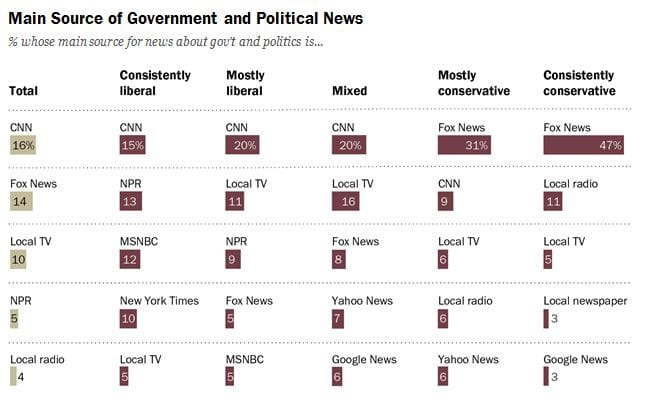Political Ideology A Polarizing Factor in Media Trust, Social Interaction

"Political Polarization & Media Habits" is the the latest report in an ongoing Pew Research project tracking partisan trends among Americans. The report found:
"When it comes to getting news about politics and government, liberals and conservatives inhabit different worlds. There is little overlap in the news sources they turn to and trust."
The project, funded by the Hewlett Foundation and MacArthur Foundation, consisted of responses from 10,013 adults divided into 5 categories -- consistently liberal or conservative, mostly liberal or conservative, and mixed (acting as the middle ground) -- in order to understand how political ideology influences the medium an individual chooses when getting their news and how they interact on social media sites.
Political Affiliation A Factor in Media Trust
Trust in media sources by those surveyed, called panelists, indicates that the largest schism is fueled by ideological differences. Fox News and NPR were the most polarized sources in terms of trust between consistent conservatives and liberals.
Consistent conservatives overwhelmingly trust Fox News (88%) while only 6 percent of consistent liberals reported trusting the network. NPR is the most trusted news source for consistent liberals, according to the survey, at 72 percent. About 3 percent of consistent conservatives said they trust NPR.
Panelists with 'mixed' political views are broadly skeptical of both news sources and reported trusting CNN the most (61%). While conservatives are more likely to agree on a main source for news, respondents with mixed political views and liberal views are more divided on what sources they prefer.

Partisanship on Social Media
Facebook and other social media sites were not only identified as sources of political news but information provided by panelists gave additional insight as to how and with whom they share political ideas. Partisan groupthink -- a psychological phenomenon associated with insulated cohesive group decisions -- carries over in terms of whom panelists associate with on social media.
Of those surveyed, 48 percent treat Facebook as a source of political news compared to other social media sites like Twitter, YouTube, Google+, and LinkedIn.
According to Pew, conservatives are more likely to follow posts on political parties, candidates, and officials than liberals who focus more on issue-based groups. On average, more than 32 percent of consistent conservatives and liberals view posts consistent with their political outlook and pay more attention to political posts than other ideological groups.Discussions by both polar groups tend to be within their own political affiliation or party. Half of consistent conservatives talk primarily with like-minded conservatives -- 43 percent of the panelists within this group discuss politics with only Republicans.
Many consistent liberals also primarily engage with other liberals (31%) and with Democrats (39%). Panelists with mixed political views said they were more likely to talk politics with conservatives and Republicans than liberals and Democrats.
Negative aspects attributed to the polarization of the country can be showcased by social trends. Of all panelists, 25 percent have responded negatively to social media content and 10 percent have dropped a friend on social media because of political differences. Thirty-two percent of consistent conservatives and 44 percent of consistent liberals have blocked, unfriended, or stopped following someone because of content.
An old adage on consumption reads, "you are what you eat," but in an era of increased partisanship and hyper-socialization, individual consumption can be best described as, "you are what you watch."
Image: GU Progressive



